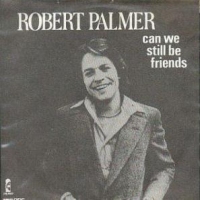Todd Rundgren version
Todd Rundgren released his version on his 1978 album Hermit of Mink Hollow . This was the only hit single on the album, reaching #29 on the US Billboard Hot 100, [1] and also peaking at #8 in Australia and #37 in Canada. The lyrics describe a relationship to which Rundgren and the woman to whom he is singing have made great efforts to fix, but simply cannot make it work. Rundgren explains this, but wishes to part amicably, asking several times if he and his partner can "still be friends." The song is generally assumed to be about Rundgren's breakup with long-time companion Bebe Buell in 1977. Rundgren played all the instruments and performed all the vocals on the track, as he did with the rest of the album.
In 1994, the song made a prominent appearance in the film Dumb and Dumber , for which Rundgren had composed the score. It also appears on the soundtrack for the 2001 film Vanilla Sky , and the TV series Nip/Tuck .
This page is based on this
Wikipedia article Text is available under the
CC BY-SA 4.0 license; additional terms may apply.
Images, videos and audio are available under their respective licenses.

